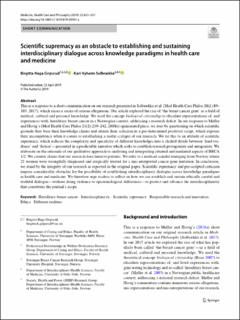| dc.contributor.author | Gripsrud, Birgitta Haga | |
| dc.contributor.author | Solbrække, Kari Nyheim | |
| dc.date.accessioned | 2020-05-15T10:17:43Z | |
| dc.date.available | 2020-05-15T10:17:43Z | |
| dc.date.created | 2019-04-26T09:38:32Z | |
| dc.date.issued | 2019 | |
| dc.identifier.citation | Medicine, Health care and Philosophy. 2019, 22 (4), 631-637. | en_US |
| dc.identifier.issn | 1386-7423 | |
| dc.identifier.uri | https://hdl.handle.net/11250/2654623 | |
| dc.description.abstract | This is a response to a short communication on our research presented in Solbrække et al. (Med Health Care Philos 20(1):89–103, 2017), which raises a series of serious allegations. Our article explored the rise of ‘the breast cancer gene’ as a field of medical, cultural and personal knowledge. We used the concept biological citizenship to elucidate representations of, and experiences with, hereditary breast cancer in a Norwegian context, addressing a research deficit. In our response to Møller and Hovig’s (Med Health Care Philos 21(2):239–242, 2018a) opinionated piece, we start by questioning on which scientific grounds they base their knowledge claims and situate their criticism in a pre-determined positivist script, which exposes their incompetency when it comes to establishing a useful critique of our research. We tie this to an attitude of scientific supremacy, which reduces the complexity and specificity of different knowledges into a clichéd divide between ‘hard evidence’ and ‘fiction’—presented in a predictable narrative which seeks to establish research protagonists and antagonists. We elaborate on the rationale of our qualitative approach to analyzing and interpreting situated and mediated aspects of BRCA 1/2. We counter claims that our research does harm to patients. We refer to a medical scandal emerging from Norway where 21 women were wrongfully diagnosed and surgically treated for a mis-interpreted cancer gene mutation. In conclusion, we stand by the integrity of our research as reported in the original paper. Scientific supremacy and pre-scripted criticism impose considerable obstacles for the possibility of establishing interdisciplinary dialogue across knowledge paradigms in health care and medicine. We therefore urge readers to reflect on how we can establish and sustain ethically careful and truthful dialogue—without doing violence to epistemological differences—to protect and advance the interdisciplinarity that constitutes the journal’s scope. | en_US |
| dc.language.iso | eng | en_US |
| dc.rights | Navngivelse 4.0 Internasjonal | * |
| dc.rights.uri | http://creativecommons.org/licenses/by/4.0/deed.no | * |
| dc.subject | helsefag | en_US |
| dc.subject | helse- og sosialfag | en_US |
| dc.subject | brystkreft | en_US |
| dc.subject | forskning | en_US |
| dc.title | Scientific supremacy as an obstacle to establishing and sustaining interdisciplinary dialogue across knowledge paradigms in health care and medicine | en_US |
| dc.type | Peer reviewed | en_US |
| dc.type | Journal article | en_US |
| dc.description.version | publishedVersion | en_US |
| dc.rights.holder | © The Author(s) 2019 | en_US |
| dc.subject.nsi | VDP::Medisinske Fag: 700 | en_US |
| dc.source.pagenumber | 631-637 | en_US |
| dc.source.volume | 22 | en_US |
| dc.source.journal | Medicine, Health care and Philosophy | en_US |
| dc.source.issue | 4 | en_US |
| dc.identifier.doi | 10.1007/s11019-019-09901-x | |
| dc.identifier.cristin | 1694073 | |
| dc.relation.project | Universitetet i Stavanger: IN-10208 | en_US |
| cristin.ispublished | true | |
| cristin.fulltext | original | |
| cristin.qualitycode | 1 | |

